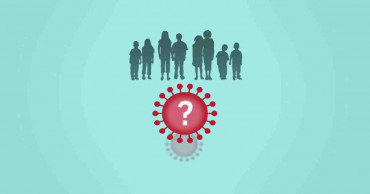infectious diseases
Is the delta variant of the coronavirus worse for kids?
Is the delta variant of the coronavirus worse for kids?
No, experts say there’s no strong evidence yet that it makes children and teens sicker than earlier versions of the virus, although delta has led to a surge in infections among kids because it’s more contagious.
Read: 'Sputnik V's efficacy against Delta varies from 83-94%'
Delta’s ability to spread more easily makes it more of a risk to children and underscores the need for masks in schools and vaccinations for those who are old enough, said Dr. Juan Dumois, a pediatric infectious disease physician at Johns Hopkins All Children’s Hospital in St. Petersburg, Florida.
Weekly infection rates among U.S. children earlier this month topped 250,000, surpassing the wintertime peak, according to data from the American Academy of Pediatrics and Children’s Hospital Association. Since the pandemic began, more than 5 million children in the U.S. have tested positive for COVID-19.
The delta variant has been identified in at least 180 countries, according to the World Health Organization. In many of them, the spike in infections has also meant an increase in hospitalizations in young children and teens.
In the U.S., the hospitalization rate for COVID-19 was less than 2 per 100,000 children in late August and early September — similar to the peak last winter, according to the Centers for Disease Control and Prevention. But the portion of kids hospitalized with severe disease hasn’t changed significantly.
Read:'10 times fewer virus particles needed to catch Delta variant'
The sheer numbers can make it seem like children are getting sicker with the delta variant, but experts say that does not appear to be the case. Most infected kids have mild infections or no symptoms and do not need to be hospitalized.
COVID-19 vaccines continue to provide protection against delta. Among children 12 and older — who are eligible for COVID-19 vaccinations — the weekly hospitalization rate in July was 10 times higher for the unvaccinated than those who have had the shots, CDC data show.
4 years ago
Fauci says US headed in ‘wrong direction’ on coronavirus
The United States is in an “unnecessary predicament” of soaring COVID-19 cases fueled by unvaccinated Americans and the virulent delta variant, the nation’s top infectious diseases expert said Sunday.
“We’re going in the wrong direction,” said Dr. Anthony Fauci, describing himself as “very frustrated.”
Read:Natural origins theory of Covid-19 still the most likely: Fauci
He said recommending that the vaccinated wear masks is “under active consideration” by the government’s leading public health officials. Also, booster shots may be suggested for people with suppressed immune systems who have been vaccinated, Fauci said.
Fauci, who also serves as President Joe Biden’s chief medical adviser, told CNN’s “State of the Union” that he has taken part in conversations about altering the mask guidelines.
He noted that some local jurisdictions where infection rates are surging, such as Los Angeles County, are already calling on individuals to wear masks in indoor public spaces regardless of vaccination status. Fauci said those local rules are compatible with the Centers for Disease Control and Prevention recommendation that the vaccinated do not need to wear masks in public.
Read:Little new evidence emerges in US probe of Covid-19 origins
More than 163 million people, or 49% of the total U.S. population, are fully vaccinated, according to CDC data. Of those eligible for the vaccine, aged 12 and over, the figure rises to 57%.
“This is an issue predominantly among the unvaccinated, which is the reason why we’re out there, practically pleading with the unvaccinated people to go out and get vaccinated,” Fauci said.
Fauci said government experts are reviewing early data as they consider whether to recommend that vaccinated individuals to get booster shots. He suggested that some of the most vulnerable, such as organ transplant and cancer patients, are “likely” to be recommended for booster shots.
Read: China rebuffs WHO’s terms for further COVID-19 origins study
He also praised Republicans, including Govs. Asa Hutchinson of Arkansas and Ron DeSantis of Florida, and the second-ranking House leader, Rep. Steve Scalise of Louisiana, for encouraging their constituents to get vaccinated. Their states have among the lowest vaccination rates in the country.
“What I would really like to see is more and more of the leaders in those areas that are not vaccinating to get out and speak out and encourage people to get vaccinated,” Fauci said.
4 years ago
Heart reaction probed as possible rare vaccine link in teens
Health authorities are trying to determine whether heart inflammation that can occur along with many types of infections could also be a rare side effect in teens and young adults after the second dose of COVID-19 vaccine.
An article on seven U.S. teen boys in several states, published online Friday in Pediatrics, is among the latest reports of heart inflammation discovered after COVID-19 vaccination, though a link to the vaccine has not been proven.
The boys, aged 14 to 19, received Pfizer shots in April or May and developed chest pain within a few days. Heart imaging tests showed a type of heart muscle inflammation called myocarditis.
Read:US to swiftly boost global vaccine sharing, Biden announces
None were critically ill. All were healthy enough to be sent home after two to six days in the hospital and are doing ’’doing pretty well,” said Dr. Preeti Jaggi, an Emory University infectious disease specialist who co-authored the report.
She said more follow-up is needed to determine how the seven fare but that it’s likely the heart changes were temporary.
Only one of the seven boys in the Pediatrics report had evidence of a possible previous COVID-19 infection and doctors determined none of them had a rare inflammatory condition linked with the coronavirus.
The cases echo reports from Israel in young men diagnosed after receiving Pfizer shots.
The U.S. Centers for Disease Control and Prevention alerted doctors last month that it was monitoring a small number of reports of heart inflammation in teens and young adults after the mRNA vaccines, the kind made by Pfizer and Moderna.
Read:Vaccine maker Serum seeks indemnity protection in India
The CDC hasn’t determined if there’s really a link to the shots, and continues to urge that everyone 12 and older get vaccinated against COVID-19, which is far riskier than the vaccine. The Pfizer vaccine is available to those as young as 12; the Moderna shot remains cleared only for adult use.
This kind of heart inflammation can be caused by a variety of infections, including a bout of COVID-19, as well as certain medications -- and there have been rare reports following other types of vaccinations.
Authorities will have to tease out whether cases following COVID-19 vaccination are occurring more often than that expected “background rate.”
For now, the CDC says most patients were male, reported symptoms after the second dose, and their symptoms rapidly improved.
“I think we’re in the waiting period where we need to see whether this is cause-and-effect or not,” said John Grabenstein of the Immunization Action Coalition, a former director of the Defense Department’s immunization program.
Read: Free beer, other new incentives for Biden’s ‘vaccine sprint’
A Pediatrics editorial noted that among U.S. children under age 18, there have been over 4 million COVID-19 cases, more than 15,000 hospitalizations and at least 300 deaths.
It said the heart inflammation cases warrant more investigation but added that ’’the benefits of vaccination against this deadly and highly transmissible disease clearly far outweigh any potential risks.”
Editorial co-author Dr. Yvonne Maldonado, head of an American Academy of Pediatrics infectious diseases committee, is involved in Pfizer vaccine studies, including a COVID-19 vaccine study in children.
4 years ago
Covid-19 virus ‘survives for 28 days’ in lab conditions
Australian scientists say SARS-Cov-2 that causes Covid-19 can survive on surfaces such as banknotes, phone screens and stainless steel for nearly a month, far longer than previously thought.
5 years ago
Infectious diseases know no borders: PM at Global Vaccine Summit
Prime Minister Sheikh Hasina on Thursday said the COVID-19 pandemic showed that infectious diseases know no borders and do not differentiate between the weak and the powerful.
5 years ago
China reports 2,147 deaths from infectious diseases in October
A total of 2,147 people died of infectious diseases on the Chinese mainland in October, official data showed.
6 years ago



.jpg)



